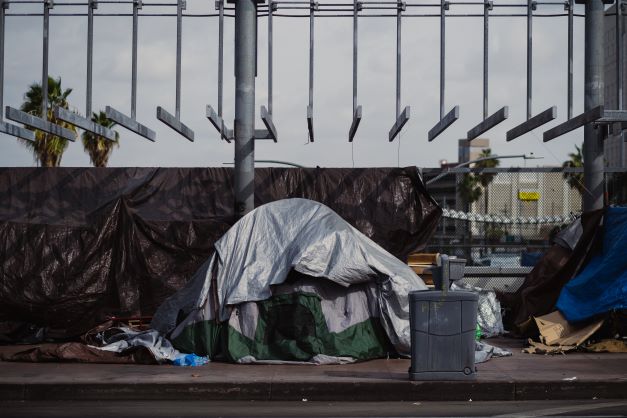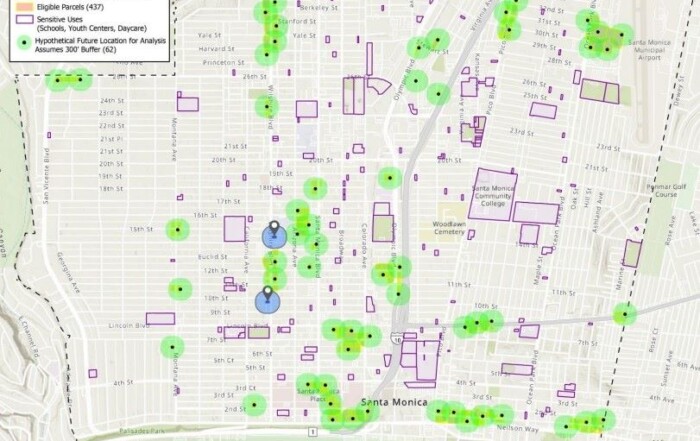Monday evening, the Culver City Council voted in favor of an anti-camping ordinance that would prevent unhoused residents from establishing a defined camping facility on public grounds.
In summarizing a staff report for the council, Assistant City Manager Jesse Mays was quick to point out, however, that the measure does not bar the unhoused from sleeping using blankets, pillows, or sleeping bags unless there is shelter space available for them to utilize.
Housing Administrator Tevis Barnes was also quick to reassure skeptical council members and the public, saying, “Staff is very conscientious about preserving the dignity of our unhoused community, and we don’t want to cause any additional trauma.” She added, “We will always lead with shelter and housing first, working with our St. Joseph’s [Center] Outreach Team to engage, conduct assessments, and link to the appropriate housing shelter and services.” She also said they would give campers 72 hours’ notice to move, and if they failed to comply, it would be social services staff and not law enforcement that would re-engage the unhoused campers. Law enforcement she says would only be on hand to ensure the safety of city staff.
A considerable 74 members of the public submitted chits to speak on the matter in public comment. The first speaker, Stephen Jones, questioned the verisimilitude between the staff reassurances earlier in the meeting and what’s actually being decided by this vote, saying, “The only new thing new is the directive to seize the possessions of unhoused people, leaving behind only a blanket and pillow – and in some cases, write tickets.” He added, “I like that they say no police are involved – that’s not in the ordinance; you say you’re going to leave their medications – that’s not in the ordinance.”
Cynthia Hart, the Correspondence Secretary with the Culver City Democratic Club, called in to read a resolution voted on by her club membership condemning the proposed ordinance. “The Culver City Democratic Club opposes the criminalization of people experiencing homelessness,” she read. “This club is on record supporting a Housing First approach.”
Bubba Fish, who serves as the Vice Chair of the city’s Advisory Committee on Housing and Homelessness, contended his committee hadn’t even been sought out for their wisdom or direction. “The Council did not go through the normal committee process on the item before us,” said Fish. “They didn’t alert or consult the committee, and I’m wondering if that’s maybe because they wouldn’t have liked the result.” Fish pointed to the fact that his committee voted 8-1 to recommend to the council to continue with a services-based approach and not to pursue the criminalization of homelessness.
Several residents countered the opposition, with speaker Jamie Wallace saying, “My understanding of what the word ‘sweeps’ are in Culver City has to do with notice given to the folks who live there, and it’s a sanitation issue – their trash is put at the curb to be picked up, and the people doing this power wash the sidewalks.” She added, “If Culver City is doing its job right, as Ms. Barnes keeps telling us, then they are leading with service; they are leading with care; they’re offering services.”
“Appreciate this item coming before you this evening, after several years of the prior majority council not doing jack to take care of the homeless, and just keeping them in these inhumane conditions.” said Jeff Cooper, adding, “And not giving them options and not helping folks that can’t make good decisions on their own.”
Melissa Sanders also couched her support for the ordinance in the idea that it’s leaving people in encampments is the really inhumane act, saying, “Unfortunately, if you have to make a resolution to force the assistance that they desperately need, then that is what you need to do.”
But later, healthcare worker Matthew Hing took to the podium to say there are real health consequences to anti-camping ordinances. “I’ve worked with unhoused residents in L.A. for almost seven years providing street medicine – including here in Culver City,” he began. “I’ve seen first-hand that these camping sweeps, and these camping prohibitions, harm my patients.” Hing then cited a 2022 Study that used 40 California Healthcare providers who work with unhoused patients and found that policies like this have serious medical and mental health consequences on the unhoused.
Councilmember Puza was quick to frame the previous council majority in a positive light, reminding his colleagues and the public that homelessness existed before the pandemic before saying, “I’ve brought this up before, but I think it’s worth bringing up again the accomplishments of the prior council because they did not create this problem. They established rent control and tenant protections. In fact, L.A. just passed the largest expansion of tenant protections recently.” He also talked about the previous council’s work on inclusionary zoning and housing production. “They tried to streamline that and get that moving.” He also pointed out that they were there for the opening stages of the mobile crisis intervention unit, Project Homekey hotel conversions, and that, “They identified safe camping sites a long time ago.”
Of the immediate action, he said, “I would have preferred to use this Emergency Ordinance as a way to fast track providing emergency services and housing; making sure that our mobile crisis intervention unit is up and running; Project Homekey is up and running; and safe camping and parking programs are online ASAP rather than focusing on punishment.”
Councilmember O’Brien was quick to point out the “Whereas statements” and findings that precede the language of the proposed ordinance, saying, “The bullet points preceding it talk about the many things people were asking for who are opposed to the ordinance.” He points out, “The first bullet point is ‘Staff will always lead with the offer of shelter, housing, and services first… should there not be voluntary compliance, staff [non-police] will respond, along with St. Joseph Center Outreach Team personnel.” He went on to list other items he perceived as benefits, such as unhoused residents being given the option to have their items stored rather than confiscated.
O’Brien was vocally challenged by members of the gallery opposed to the ordinance throughout his initial comments, though he gained some applause back when he assured the chamber he didn’t want the ordinance enforced until services and Operation Homekey were in full swing.
Eriksson defended his support of the Ordinance by lamenting opponents, commenting, “I feel there’s forces in our city who’s trying to paint this picture that is not really correct, and it sort of gets everyone so worked up and so frustrated, and I think this is terrible and criminal and whatever. But that is not how this is going to happen.”
In seeking staff’s definition of what a “Sweep” is, Vice Mayor Yasmine-Imani McMorrin was told by Ms. Barnes that the city defines a sweep as a “forcible removal of people.” To which McMorrin asked, “What is it called what we do?” To which Barnes said, “We are basically doing clean-ups and getting folks into services and housing.”
“Is there enforcement without housing in the ordinance?” McMorrin ultimately asked after a series of clarifying questions on the definition of services provided.
City Attorney quickly went into defensive mode, and, seeming quite annoyed by McMorrin, said city staff isn’t going to move forward on enforcement until the council is ready. He suggested if the council wants to wait until Operation Room Key and other services come online, they can direct staff to do so.
When it came time to offer critical comment on the proposed ordinance, a passionate and clearly exasperated McMorrin said, “We have a choice tonight to provide care or provide punishment.” Later adding, “It is unconscionable that in winter and in unprecedented storms that this council would choose to criminalize homelessness and enforcement that is paid through our tax dollars…we need harm reduction, and not enforcement.”
For his part, Mayor Albert Vera acknowledged the difficulty of the issue while defending previously rejected options like Pallet Housing (a.k.a. miniature homes) which he says at least gives unhoused people something that’s theirs and can be locked. He ultimately agrees it’s a housing issue, but fears the city would have to wait three to six years for significant housing to come online. Despite being in support, he conceded, “I don’t by any means want any enforcement to take place until anything is online.”
McMorrin tried to introduce an alternative motion adding notes about conditions for enforcement, but she was rebuffed by staff, which curiously called it “inappropriate.” Puza was successful with an amendment establishing further discussion on specific programs.
The Ordinance was passed, 3-2, with McMorrin and Puza opposed.
Photo by Levi Meir Clancy on Unsplash
Stay informed. Sign up for The Westside Voice Newsletter
By clicking submit, you agree to share your email address with Westside Voice. We do not sell or share your information with anyone.








